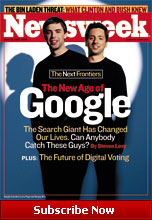|
|
 |
Google's CEO and chairman Eric Schmidt—brought in by Brin and Page as the designated adult to run the company is a veteran of Sun and Novell, so he knows something about being Netscaped. He thinks it won't happen to Google. "Why should we assume that that's any more likely than the 50 other scenarios that we could come up with that don't involve this diabolical Netscape kind of thing? This search stuff is very hard to do, and it's really very hard to do at the kind of scale that Google does it at. People will have multiple choices, and our goal is to get as many of those choices as possible to be Google."
| advertisement |
Sergey Brin agrees. "I think we're pretty far along compared to 10 years ago," he says. "At the same time, where can you go? Certainly if you had all the world's information directly attached to your brain, or an artificial brain that was smarter than your brain, you'd be better off. Between that and today, there's plenty of space to cover."
Indeed, over the next few years search will evolve in a number of key areas, and Google faces big competition in all of them.
DEEP CONTENT. Searching the Web can yield amazing results, but they're still limited and skewed. "What's on the Web is extremely ephemeral," says Brewster Kahle. "Very little of it was written before 1995." Amazon took a giant step to address this with its Search Inside the Book feature that lets people query a library of 120,000 tomes. Despite the pay-for-content controversy, Yahoo's CAP is an intriguing attempt to lure content providers not on the public Web to submit to its indexes. "It might take a decade or two to put all the world's information into Google and do things with it," says engineering VP Wayne Rosing. "But it's an achievable goal."
MULTIMEDIA. Google has an Image Search function with almost a billion pictures. Microsoft researchers in China are going full blast to create software that searches through pictures—possibly identifying faces and locations. Meanwhile, a Washington, D.C., start-up called Streamsage has created breakthrough technology that searches audio and video broadcasts by analyzing speech. And AOL, whose search strategy is to build features on top of Google technology, recently bought an audio-video search operation called SingingFish.
PERSONALIZATION. A search engine that knows you're a sports-car buff is more likely to give you auto sites when you query the word Jaguar. Google here is at a disadvantage compared with places like Yahoo and Amazon, which know a lot about their customers.
LOCALIZATION. Last week Google introduced its local search, which produces a map when you type in a category (say "restaurants") and a ZIP code. But again, Yahoo and MSN have loads of information about where its users live. The breakthrough here might come in a marriage of search engines and cell phones.
ARTIFICIAL INTELLIGENCE. "The ultimate goal is to have a computer that has the kind of semantic knowledge that a reference librarian has," says Google's director of technology Craig Silverstein. But truly smart search engines are probably decades away.
Typical Google big-think. But skeptics are saying that Google's increasingly varied roster of services shows that the company is losing focus. And that its bottom-up style causes chronic disorganization. CEO Schmidt isn't worried. "I believe the disorganization is a feature," he says. "The culture of companies is set early, and if you changed it, you'd lose all of the great things. This model has worked very well for us."
The confidence is reminiscent of the mood at another Mountain View, Calif., company in 1996: Netscape. Schmidt rejects the comparison. "The best check on hubris," he says, "is your competitors." And now, the Google guys have plenty of 'em.
With Brad Stone in San Francisco
Previous
Page 1: It's Good to Be
Google
Page 2: Yahoo's Google
buster
|
|
|






